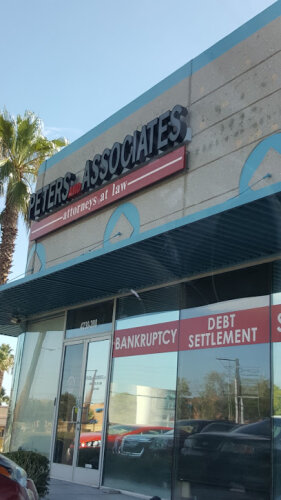Best Real Estate Contracts and Negotiations Lawyers in Las Vegas
Share your needs with us, get contacted by law firms.
Free. Takes 2 min.
Free Guide to Hiring a Real Estate Lawyer
List of the best lawyers in Las Vegas, United States
About Real Estate Contracts and Negotiations Law in Las Vegas, United States
Real estate contracts and negotiations in Las Vegas are governed by a mix of federal, Nevada state, and local Clark County rules. Transactions commonly include purchase and sale agreements, leases, listing agreements, construction contracts, and contracts related to homeowners associations. While standard contract forms are widely used, every transaction includes negotiable terms - price, contingencies, property condition, closing date, title and escrow instructions, and allocation of closing costs. Las Vegas is part of Clark County, which has its own recording, taxing, and permitting procedures that affect closings and title transfer. Buyers, sellers, landlords, tenants, developers, and investors all face legal issues that can affect risk allocation and the enforceability of agreements.
Why You May Need a Lawyer
Real estate deals often involve large sums, multiple parties, and complex timelines. A lawyer can protect your legal rights and financial interests in many situations. Common reasons to consult an attorney include:
- Complex or high-value purchases or sales where contract terms can significantly affect outcome
- Disputes about contract performance, earnest money, or deposit releases
- Title defects, easements, boundary disputes, or unresolved liens
- Foreclosure, short-sale, or distressed-property transactions
- Commercial leases or commercial purchase agreements that include complex indemnity, default, or zoning provisions
- Negotiating or reviewing homeowners association contracts, CC&R enforcement, or amendments
- Construction contracts, contractor disputes, mechanic lien concerns, or warranty issues
- Real estate closings involving unusual financing, out-of-state parties, or investor structures
A lawyer can draft or revise contract language, advise on risk allocation, represent you in negotiations, and litigate or mediate disputes if necessary. Even when using a broker or standard forms, legal review can prevent costly mistakes.
Local Laws Overview
Key local and state features that commonly affect real estate contracts in Las Vegas include the following.
- Mandatory writing requirement - Like all states, Nevada generally requires real estate contracts to be in writing to be enforceable for transfers of interest in land. Electronic signatures are generally accepted under electronic signature laws, but parties should confirm the method meets legal and lender requirements.
- Seller disclosures - Nevada requires sellers to disclose known material defects and certain property conditions. Standard disclosure forms are commonly used. Failing to disclose known defects can lead to contract rescission, damages, or statutory penalties.
- Escrow and title - Many Las Vegas transactions close through escrow and are supported by title insurance. Title searches uncover liens, judgments, easements, and other matters that can affect marketable title. Parties must often resolve title exceptions before closing.
- Earnest money and deposits - Contracts set timelines and conditions for deposit release or forfeiture. Disputes over earnest money are common and often resolved by agreement, escrow instructions, or litigation.
- Zoning, land use, and permits - Clark County zoning and Las Vegas municipal rules control permitted uses, development standards, and building permits. Due diligence on zoning compliance and permit history is essential, especially for redevelopment or commercial projects.
- Homeowners associations - Many Las Vegas residential communities are governed by HOAs with CC&Rs, architectural rules, and fee assessments. HOA resale disclosures and estoppel letters are important contract attachments.
- Leasing and landlord-tenant law - Residential and commercial leases carry specific notice requirements, security deposit rules, and maintenance obligations. Nevada landlord-tenant statutes and local ordinances can affect eviction, habitability, and damages.
- Foreclosure and distressed sales - Nevada law provides procedures for judicial and nonjudicial foreclosures. Buyers in short sales or foreclosure auctions face specific title and redemption risks.
- Local taxes and transfer fees - Clark County recording, transfer, and documentary fees, as well as property tax proration practices, affect the economics of a transaction. Parties negotiate who pays which fees in the purchase agreement.
Frequently Asked Questions
What should be included in a residential purchase agreement in Las Vegas?
A residential purchase agreement should identify the parties, legal description of the property, purchase price, earnest money amount and deposit instructions, financing and inspection contingencies, closing date and location, prorations for taxes and utilities, title and escrow instructions, required disclosures, condition of the property, and default and remedy provisions. It should also specify which items are included or excluded from the sale and any seller or buyer obligations before closing.
Are sellers in Nevada required to complete a property disclosure form?
Yes, sellers are typically required to provide buyers with a written property condition disclosure that identifies known material defects and conditions. The disclosure helps buyers make informed decisions and often becomes an attachment to the purchase agreement. Failing to disclose known defects can create liability for the seller.
How does earnest money work and what happens if a buyer backs out?
Earnest money is a deposit to show the buyer is serious. The contract dictates how it is held - usually in escrow - and under what circumstances it can be released. If the buyer backs out within contractually allowed contingencies, the deposit is usually returned. If the buyer breaches without a valid contingency, the seller may be entitled to keep the deposit as liquidated damages or pursue other remedies, depending on the contract language and applicable law.
Do I need title insurance in Las Vegas?
Title insurance is common and advisable. The buyer's policy protects against title defects, liens, and undisclosed claims that were not found in the public record at closing. Lenders usually require a lender's title policy; buyers should consider an owner's title policy to protect their equity.
Can an agent act for both buyer and seller in Nevada?
Dual agency - where one agent represents both parties - may be allowed with proper disclosure and consent, but it can create conflicts of interest. Nevada rules require disclosure of agency relationships. Some parties prefer separate representation or independent legal counsel to avoid potential conflicts.
What contingencies should I include in an offer?
Common contingencies include financing approval, satisfactory inspection and repair negotiations, appraisal meeting the purchase price, review of HOA documents, clear title, and acceptable disclosures. The exact contingencies depend on the property type and your risk tolerance. Well-drafted contingency deadlines are critical to avoid unintended forfeiture of rights.
How long does closing usually take in Las Vegas?
Closing timelines vary. A straightforward cash sale can close in a few days once title and escrow requirements are complete. Purchases relying on mortgage financing commonly close in 30 to 45 days, depending on lender processing, appraisal, title clearance, and contingency removal. Delays can occur for title issues, unresolved inspections, or lender conditions.
What are common title issues in Las Vegas transactions?
Common issues include recorded liens, unpaid assessments, unknown easements, unreleased mortgages, judgments, chain-of-title breaks, and former owner disputes. Building code violations or unpermitted improvements can also surface during due diligence. Addressing title exceptions before closing is crucial to obtaining marketable title.
How do HOAs affect a sale or purchase?
HOAs can impose covenants, conditions, and restrictions that limit property use and require assessments. Buyers should review CC&Rs, bylaws, budgets, and any pending litigation or special assessments. Contracts often include an HOA document review contingency and require estoppel letters confirming account status and assessment amounts.
When should I hire a real estate lawyer in Las Vegas?
Consider hiring a lawyer before signing any binding agreement if the deal is complex, involves unusual financing, has title or boundary questions, includes significant repairs or construction, or if you anticipate a dispute. If you have limited experience with negotiations or want to ensure contract terms and contingencies protect your interests, early legal review is beneficial.
Additional Resources
Below are local and state organizations and resources that can be helpful when dealing with real estate contracts and negotiations in Las Vegas.
- Nevada Real Estate Division - licensing, regulations, and consumer guidance for brokers and agents
- Nevada State Bar - resources for finding and vetting attorneys and understanding client protections
- Clark County Recorder - property records, deed recording, and title document information
- Clark County Assessor - property tax assessments and parcel information
- Clark County Treasurer or Recorder office - guidance on transfer fees, recording fees, and local procedures
- Eighth Judicial District Court - local court where many real property disputes in Clark County are litigated
- Nevada Legislature and Nevada Revised Statutes - for state laws that impact real property and contracts
- Nevada Association of Realtors and Greater Las Vegas Association of Realtors - industry forms, local market guidance, and standard contract templates
- Local title companies and escrow officers - assist with title searches, title insurance, and closing logistics
Next Steps
If you need legal assistance with a real estate contract or negotiation in Las Vegas, consider the following practical steps.
- Gather documents - collect the purchase agreement, MLS listing, seller disclosures, title report, HOA documents, inspection reports, and any correspondence with other parties or agents.
- Identify your objectives - decide whether you want to negotiate terms, seek specific remedies, get a contract review, or prepare for litigation or mediation.
- Schedule an initial consultation - contact a real estate attorney experienced in Nevada and Clark County matters. Prepare a concise summary of the transaction and key issues.
- Ask key questions during the consultation - experience with similar cases, fee structure, estimated timelines, potential outcomes, and recommended next steps. Clarify whether the attorney expects flat fees, hourly billing, or retainers.
- Consider parallel professionals - involve a qualified inspector, licensed appraiser, and a reputable title company when appropriate. Use an agent for market and negotiation support, but consult your attorney for legal risk assessments.
- Move promptly on deadlines - real estate contracts include strict notice and contingency deadlines. Meet or request extensions in writing to avoid waiving rights.
- Keep communication documented - keep copies of emails, signed amendments, and escrow instructions. Written records help resolve disputes.
Working with an experienced Las Vegas real estate lawyer early in the process can reduce risk, clarify obligations, and improve negotiation outcomes. If the matter is urgent, prioritize finding counsel who can review documents quickly and advise on immediate steps to protect your interests.
Lawzana helps you find the best lawyers and law firms in Las Vegas through a curated and pre-screened list of qualified legal professionals. Our platform offers rankings and detailed profiles of attorneys and law firms, allowing you to compare based on practice areas, including Real Estate Contracts and Negotiations, experience, and client feedback.
Each profile includes a description of the firm's areas of practice, client reviews, team members and partners, year of establishment, spoken languages, office locations, contact information, social media presence, and any published articles or resources. Most firms on our platform speak English and are experienced in both local and international legal matters.
Get a quote from top-rated law firms in Las Vegas, United States — quickly, securely, and without unnecessary hassle.
Disclaimer:
The information provided on this page is for general informational purposes only and does not constitute legal advice. While we strive to ensure the accuracy and relevance of the content, legal information may change over time, and interpretations of the law can vary. You should always consult with a qualified legal professional for advice specific to your situation.
We disclaim all liability for actions taken or not taken based on the content of this page. If you believe any information is incorrect or outdated, please contact us, and we will review and update it where appropriate.











